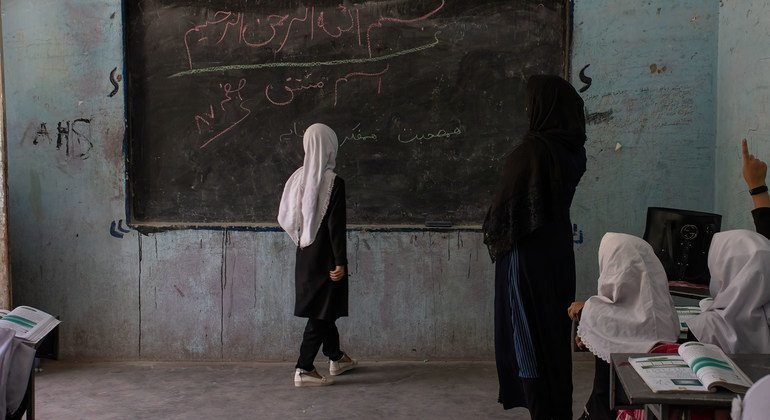When the Taliban banned girls in March from going to school, Qatar was quick to release a statement expressing its disappointment in the decision.
Qatar and France discussed the rights of Afghan women and girls in education on Sunday as the Taliban continue to restrict learning for all females in Afghanistan.
The discussion took place in Doha on Sunday between Qatar’s Assistant Foreign Minister Lolwah Al Khater and the representative of the French Embassy to Afghanistan Jean-Marin Schuh.
The French ambassador to Qatar Jean-Baptiste Faivre was also in attendance.
“During the meeting, they reviewed the developments in Afghanistan, the rights of women and girls in education, and the strengthening of the role of Afghan civil society,” read a statement by Qatar’s foreign ministry.
The statement added that the diplomats discussed the enhancement of international cooperation in Afghanistan.
The matter was also discussed between Al Khater and UK Foreign Commonwealth Office official Lord Tariq Ahmad of Wimbledon. Similarly, the officials tapped into developments in Afghanistan along with other regional and international issues of common interest.
The latest meetings come amid ongoing concern over the rights of women and girls in Afghanistan, with the interim government continuing to impose restrictions on their right to work and education.
Qatar repeatedly stressed the need to empower women and girls in Afghanistan since the Taliban seized control of Kabul on 15 August last year.
Qatar’s support for girls’ education
Qatar was quick to release a statement expressing its disappointment in a Taliban decision to ban girls from going to school in March.
Doha has also been a safe space for Afghan student evacuees, including the all-girls robotics team the Afghan Dreamers, who are continuing their education in Qatar.
Last month, Doha launched the Qatar Afghan Scholarship Project (QASP) on the sidelines of the 77th United Nations General Assembly (UNGA).
The initiative was announced by Education Above All (EAA) and the Qatar Fund For Development (QFFD).
The QASP is also a collaboration with the Afghan Future Fund (AFF), Schmidt Futures, the Yalda Hakim Foundation, Rockefeller Philanthropy Advisors and the Institute of International Education (IIE).
The launch marked the start of the 2022-2023 academic year, welcoming 250 Afghan students to more than 40 US colleges and universities on full scholarships in at least 17 states. Some of the educational institutions include Rutgers University, Bard College and the University of Texas.
Also on the sidelines of the UNGA, Qatar launched the Women in Conflict Zones (WICZ) initiative in an effort to empower women and girls living in crisis-hit countries globally.
The WICZ initiative was launched by the QFFD in collaboration with the United Nations Development Programme (UNDP).
The event took place under the presence of Qatari officials including Assistant Foreign Minister Lolwah Al Khater and Minister of Social Development and Family Mariam Al-Misnad.
“This is a programme that is one of its kind in our region and we hope that it will have, hopefully, a positive impact on girls and women in our region and beyond,” Al Khater told Doha News at the event.
The senior Qatari official added that the initiative “focuses on developmental projects for women in different areas in our region and beyond the region”.
“This includes education in the health sector, economic empowerment, peace and mediation, and also three other areas,” noted Al Khater.







